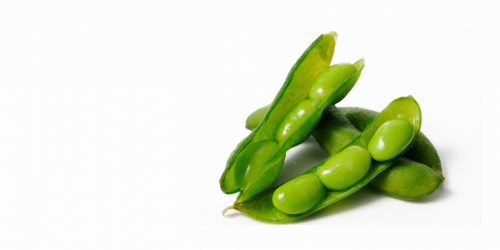
Soy has gotten a bad reputation lately. With so much information circulating, what’s the real deal on soy, and is it a friend or foe?
Soy is derived from soybeans, which is a popular legume of Asian origin. Soy is a complete protein, containing all nine essential amino acids. Minimally processed forms of soy are edamame, soymilk, tofu and tempeh.
Soybeans are naturally low in saturated fat and are a good source of vitamin C, folate, calcium, iron, magnesium, phosphorus, potassium and thiamin.
So why has soy gotten a bad name? Because of a misunderstanding of the actions of plant-derived phytoestrogens compared to estrogen that is produced in the body, or endogenous estrogen. Soybeans contain isoflavones, which are a type of phytoestrogen. Phytoestrogens are estrogen-like compounds found in plants. Although phytoestrogens are similar to the primary female sex hormone estrogen and can weakly bind to the same internal estrogen receptors, phytoestrogens are not the same as endogenous estrogen and behave differently in the body.
In scientific studies, phytoestrogens have been shown to have positive effects. Phytoestrogens can help improve heart function by reducing cholesterol. (1) Isoflavones can help to improve blood pressure by improving blood flow. (1) Phytoestrogens can also reduce fasting blood sugar levels and can aid in weight loss. (1) Phytoestrogens also decreased risk of menopausal symptoms, osteoporosis, and brain disease. (2) In countries where people consume soybeans containing isoflavones and their minimally processed products, the incidence of chronic disease is lower, compared to Western (U.S.) populations who consume fewer soy products. (1)
One major myth about soy is that it increases risk for breast cancer and should be avoided in women who have had breast cancer. Multiple studies have shown that consuming soy isoflavones can reduce the risk of breast cancer in pre- and post-menopausal women. (3) Soy isoflavones may, in fact, block multiplication of tumor cells and cause tumor cell death. Studies have also shown that soy may reduce risk of recurrence and death in women who consume soy and have a diagnosis of breast cancer. (4)
Supplements and highly processed foods containing soy do not have the health benefits of the naturally occurring isoflavones found in soybeans and minimally processed soy products and should therefore be avoided.
So, soy indeed is a friend. “The Lord has provided antidotes for disease in simple plants, and these can be used by faith” (Manuscript 65, 1899).
Faith, however, does not preclude us from the advice of trained health care providers so always remember to discuss your health condition with your medical provider.
And God said, “Behold, I have given you every herb bearing seed, which is upon the face of all the earth, and every tree, in the which is the fruit of a tree yielding seed; to you it shall be for meat.” Genesis 1:29 KJV
Desmawati D, Sulastri D. Phytoestrogens and Their Health Effect. Open Access Maced J Med Sci. 2019;7(3):495-499. Published 2019 Feb 14. doi:10.3889/oamjms.2019.044
Gorzkiewicz J, Bartosz G, Sadowska-Bartosz I. The Potential Effects of Phytoestrogens: The Role in Neuroprotection. Molecules. 2021; 26(10):2954. https://doi.org/10.3390/molecules26102954
Boutas I, Kontogeorgi A, Dimitrakakis C, Kalantaridou S. Soy Isoflavones and Breast Cancer Risk: A Meta-analysis. In Vivo Mar 2022, 36 (2) 556-562; DOI: 10.21873/invivo.12737
Kucuk, O. (2017). Soy foods, isoflavones, and breast cancer. Cancer, 123: 1901-1903. https://doi.org/10.1002/cncr.30614
Christina Wells is health ministries director for Lake Region Conference.